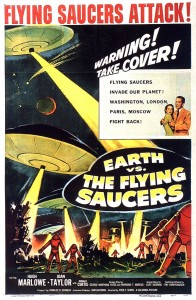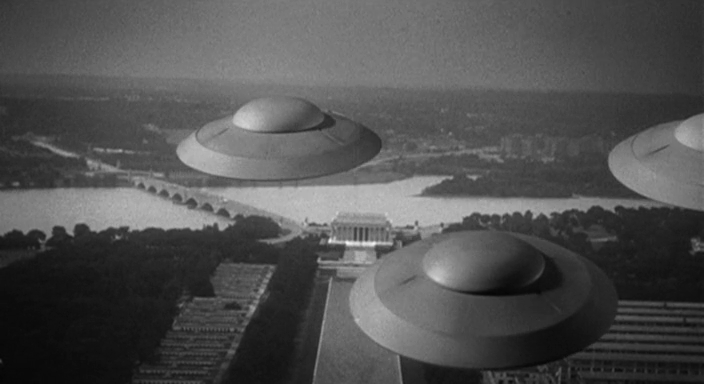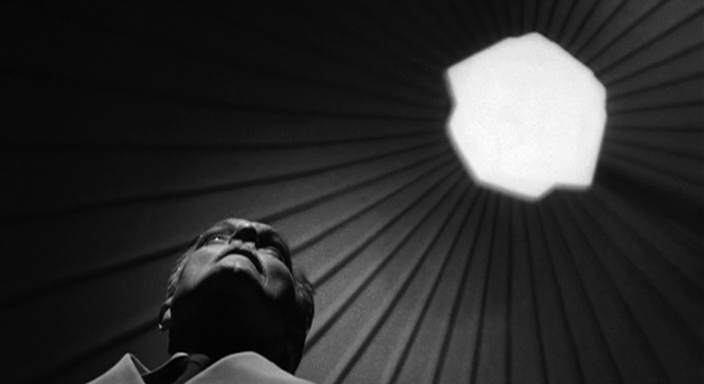“When an armed and threatening power lands uninvited in our capitol, we don’t meet it with tea and cookies.”
|

Synopsis:
While returning from their honeymoon, a scientist (Hugh Marlowe) and his new wife (Joan Taylor) spot a flying saucer and soon learn that a fleet of aliens are intending to take over the Earth.
|
|
Genres, Themes, Actors, and Directors:
- Aliens
- Hugh Marlowe Films
- Ray Harryhausen Films
- Science Fiction
- World Domination
Response to Peary’s Review:
Peary writes that this “enjoyable, flashy science fiction” film features “some spectacular special effects by Ray Harryhausen”, particularly during the “film’s climax” in which “alien rays shatter some of D.C.’s best-known buildings”. There’s not much complexity to the plot (the primary goal is “to come up with a weapon that will stop” the aliens) or the characters (Taylor’s role as Marlowe’s adoring new wife feels especially dated), but as Richard Scheib notes, the script (written in part by Curt Siodmak):
… comes packed with all sorts of novel inventions and devices – forcefields, room-sized computers, a device that indexes all the information inside a human head, the aliens in their blank metal suits with helmets that are revealed to operate by amplifying the senses, rayguns and flashing Van Der Graaf accelerators, [and] even a muddled suggestion of relativity theory at one point.
Most enjoyable, though, are Harryhausen’s surprisingly “realistic” flying saucers — they’re the primary reason to check this one out.
Redeeming Qualities and Moments:
- Harryhausen’s impressive special effects

- Effective cinematography

Must See?
Yes, as an iconic alien invasion flick from the 1950s.
Categories
Links:
|



One thought on “Earth vs. the Flying Saucers (1956)”
A once-must, as a fine example of ’50s sci-fi. No doubt, those who take to it, in particular, will lean toward a repeat viewing at some point. This is a solid entry in the genre.
Unlike with ’20 Million Miles to Earth’ – which I just rewatched, and more or less ‘suffered’ through’ – I wouldn’t say that Harryhausen’s (again impressive) work is the “primary reason to check this one out”. Here, what RH has done is part of a practically seamless work (in sci-fi terms): there’s a nifty script, decent acting (keeping in mind that sci-fi acting is something apart from regular acting, but it still needs to be believable), a good deal of effective camerawork, and surprisingly solid direction by Fred F. Sears. (This is considered his best film; he passed away the following year at age 44.)
While it’s not necessarily a great film, it satisfies within the scope of what it sets out to accomplish as sci-fi.